Get random Key and Value from a Dictionary in Python
Last updated: Apr 9, 2024
Reading time·4 min

# Table of Contents
- Get random key and value from a dictionary in Python
- Get a random key from a dictionary in Python
- Get a random value from a dictionary in Python
- Get multiple random keys and values from a Dictionary in Python
- Get multiple random keys and values from a Dictionary using random.choices()
# Get random key and value from a dictionary in Python
To get a random key-value pair from a dictionary:
- Use the
dict.items()method to get a view of the dictionary's items. - Use the
list()class to convert the view to a list. - Use the
random.choice()method to get a random key-value pair from the dictionary.
import random my_dict = { 'name': 'Borislav Hadzhiev', 'fruit': 'apple', 'number': 5, 'website': 'bobbyhadz.com', 'topic': 'Python' } # ✅ get random key-value pair from dictionary key, value = random.choice(list(my_dict.items())) print(key, value) # 👉️ name Borislav Hadzhiev # ----------------------------------------------- # ✅ get random key from dictionary key = random.choice(list(my_dict)) print(key) # 👉️ topic # ----------------------------------------------- # ✅ get random value from dictionary value = random.choice(list(my_dict.values())) print(value) # 👉️ bobbyhadz.com
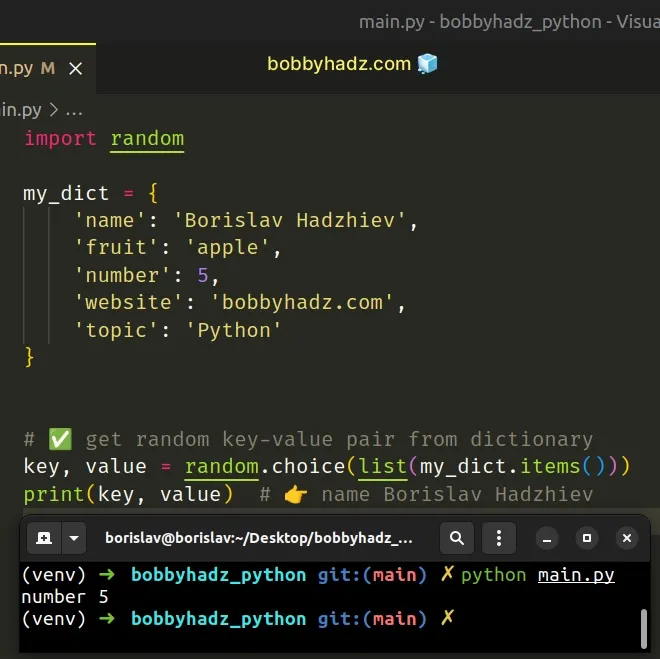
The dict.items() method returns a new view of the dictionary's items ((key, value) pairs).
my_dict = { 'name': 'Borislav Hadzhiev', 'fruit': 'apple', 'number': 5, 'website': 'bobbyhadz.com', 'topic': 'Python' } # 👇️ dict_items([('name', 'Borislav Hadzhiev'), ('fruit', 'apple'), ('number', 5), ('website', 'bobbyhadz.com'), ('topic', 'Python')]) print(my_dict.items())
list() class to convert the view of key-value pairs to a list before passing it to the random.choice() method.The list class takes an iterable and returns a list object.
The random.choice() method takes a sequence and returns a random element from the non-empty sequence.
import random my_dict = { 'name': 'Borislav Hadzhiev', 'fruit': 'apple', 'number': 5, 'website': 'bobbyhadz.com', 'topic': 'Python' } key, value = random.choice(list(my_dict.items())) print(key, value) # 👉️ website bobbyhadz.com
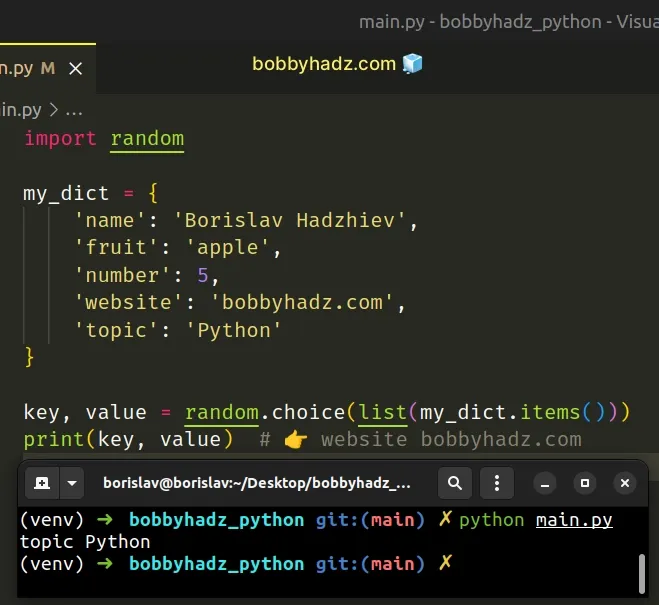
If the sequence is empty, the random.choice() method raises an IndexError.
# Get a random key from a dictionary in Python
This is a two-step process:
- Use the
list()class to convert the dictionary to a list of keys. - Use the
random.choice()method to get a random key from the list.
import random my_dict = { 'name': 'Borislav Hadzhiev', 'fruit': 'apple', 'number': 5, 'website': 'bobbyhadz.com', 'topic': 'Python' } key = random.choice(list(my_dict)) print(key) # 👉️ topic
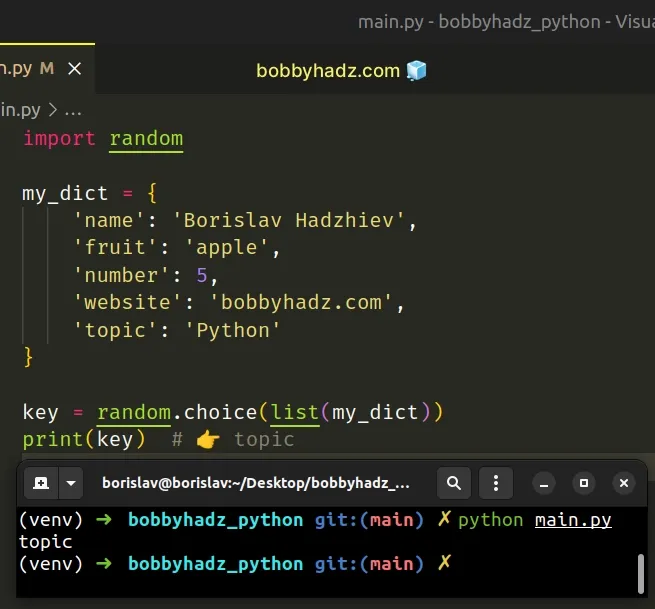
We used the list() class to convert the dictionary to a list of keys.
my_dict = { 'name': 'Borislav Hadzhiev', 'fruit': 'apple', 'number': 5, 'website': 'bobbyhadz.com', 'topic': 'Python' } # 👇️ ['name', 'fruit', 'number', 'website', 'topic'] print(list(my_dict)) # 👇️ ['name', 'fruit', 'number', 'website', 'topic'] print(list(my_dict.keys()))
dict.keys() method to be more explicit.The dict.keys() method returns a new view of the dictionary's keys.
The last step is to pass the list of keys to the random.choice() method to get
a random key.
# Get a random value from a dictionary in Python
This is a three-step process:
- Use the
dict.values()method to get a view of the dictionary's values. - Use the
list()class to convert the view object to a list. - Use the
random.choice()method to get a random value from the dictionary.
import random my_dict = { 'name': 'Borislav Hadzhiev', 'fruit': 'apple', 'number': 5, 'website': 'bobbyhadz.com', 'topic': 'Python' } value = random.choice(list(my_dict.values())) print(value) # 👉️ Borislav Hadzhiev
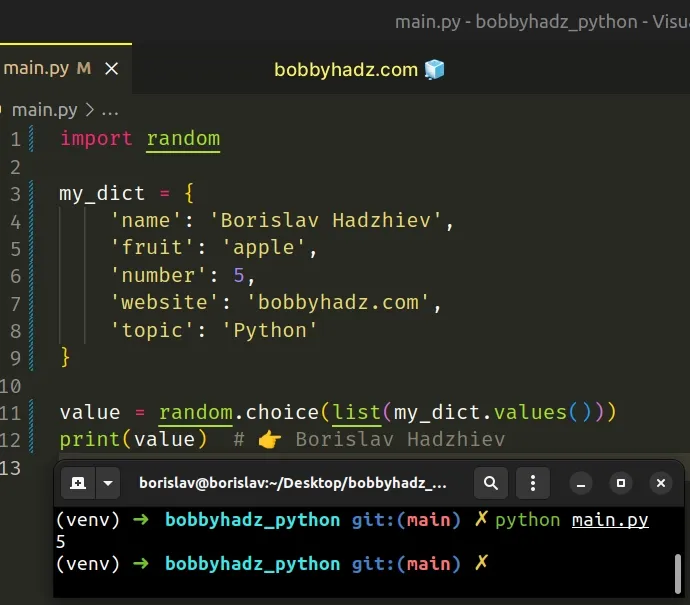
The dict.values() method returns a new view of the dictionary's values.
import random my_dict = { 'name': 'Borislav Hadzhiev', 'fruit': 'apple', 'number': 5, 'website': 'bobbyhadz.com', 'topic': 'Python' } # 👇️ dict_values(['Borislav Hadzhiev', 'apple', 5, 'bobbyhadz.com', 'Python']) print(my_dict.values())
We used the list() class to convert the view object to a list and used the
random.choice() method to get a random value from the list.
# Get multiple random keys and values from a Dictionary in Python
If you need to get multiple random keys and values from a dictionary, use the
random.sample() method.
import random my_dict = { 'id': 1, 'name': 'Bobbyhadz', 'age': 30, 'country': 'Chile', 'city': 'Santiago', } random_keys = random.sample(list(my_dict), 2) print(random_keys) # 👉️ ['age', 'name'] random_values = random.sample(list(my_dict.values()), 2) print(random_values) # 👉️ [30, 'Bobbyhadz'] random_items = random.sample(list(my_dict.items()), 2) print(random_items) # 👉️ [('country', 'Chile'), ('id', 1)]
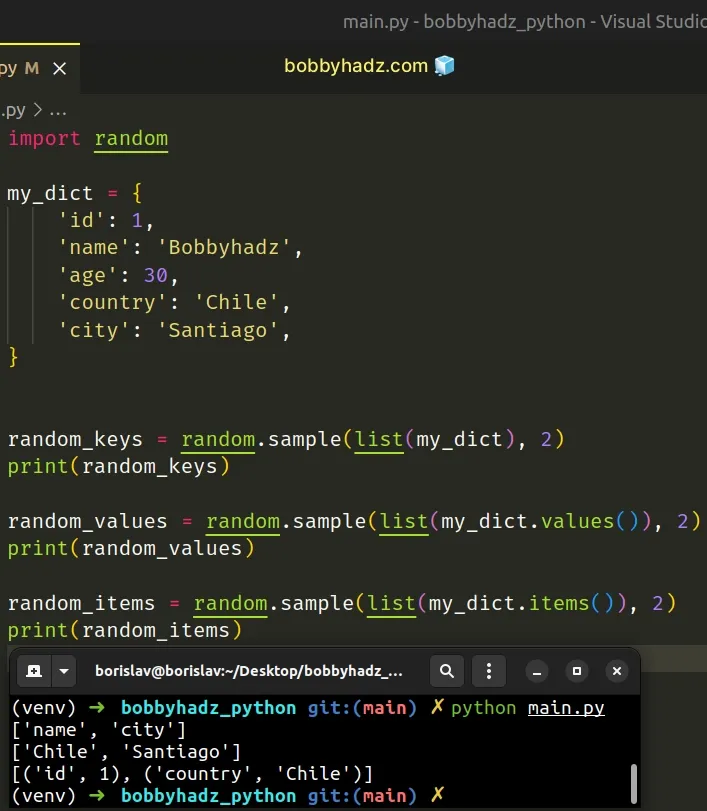
The random.sample() method returns a list of N unique elements chosen from the provided sequence.
Notice that we used the list() class to convert the dictionary's keys, values
and items to lists in the call to random.sample().
We can't directly pass a dictionary to the random.sample() method.
# Get multiple random keys and values from a Dictionary using random.choices()
You can also use the random.choices() method to get multiple random keys and
values from a dictionary.
import random my_dict = { 'id': 1, 'name': 'Bobbyhadz', 'age': 30, 'country': 'Chile', 'city': 'Santiago', } random_keys = random.choices(list(my_dict), k=2) print(random_keys) # 👉️ ['name', 'country'] random_values = random.choices(list(my_dict.values()), k=2) print(random_values) # 👉️ ['Santiago', 30] random_items = random.choices(list(my_dict.items()), k=2) print(random_items) # 👉️ [('id', 1), ('city', 'Santiago')]
The
random.choices()
method returns a k sized list of elements chosen from the provided iterable
with replacement.
If the iterable is empty, the method raises an IndexError exception.
import random my_dict = { 'id': 1, 'name': 'Bobbyhadz', 'age': 30, 'country': 'Chile', 'city': 'Santiago', } random_keys = random.choices(list(my_dict), k=3) print(random_keys) # 👉️ ['city', 'city', 'name'] random_values = random.choices(list(my_dict.values()), k=3) print(random_values) # 👉️ ['Santiago', 1, 'Santiago'] random_items = random.choices(list(my_dict.items()), k=3) # 👇️ [('age', 30), ('name', 'Bobbyhadz'), ('name', 'Bobbyhadz')] print(random_items)
Notice that when using the random.choices() method it is possible to get
repeated values.
This is not the case when using the random.sample() method.
The random.sample() method can never return repeated values.
# Additional Resources
You can learn more about the related topics by checking out the following tutorials:

